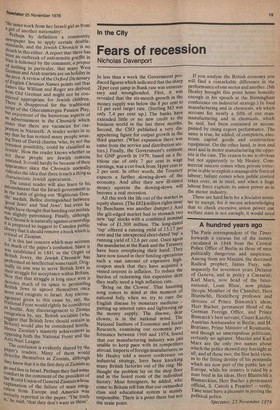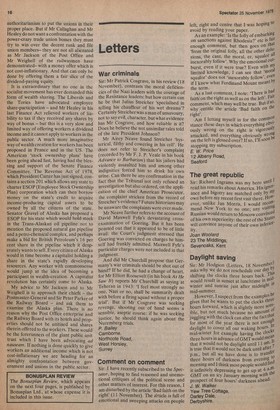In the City
Fears of recession
Nicholas Davenport
In less than a week the Government produced figures which indicated that the sharp 21 per cent jump in Bank rate was unnecessary and wrongheaded. First, it was revealed that the six-month growth in the money supply was below the 8 per cent to 12 per cent target rate. (Sterling M3 was only 7,4 per cent up.) The banks have extended little or no new credit to the business world in the last three months. Second, the CSO published a very disappointing figure for output growth in the third quarter. (What expansion there was came from the service and distribution sectors.) Finally, the Government's estimate for GNP growth in 1979, based on a fictitious rise of only 7 per cent in wage earnings, was a cut-back from 3iper cent to 2 per cent. In other words, the Treasury expects a further slowing-down of the economy. And after their new ill-timed money squeeze the slowing-down will become a real recession. All this took the life out of the market in equity shares. (The £821million rights issue by Beechams was another damper.) And the gilt-edged market had to stomach two new 'tap' stocks with a combined nominal value of £.1,300 million. The long-dated 'tap' offered a running yield of 13.17 per cent and the unexpected short-dated `tap '.a running yield of 12.6 per cent. Once again the mandarins at the Bank and the Treasury have been overplaying their hand. They have now issued in their funding operations such a vast amount of expensive highcoupon stock that they have acquired a vested interest in inflation. To reduce the burden of redeeming this expensive debt they really need a high inflation rate. 'Bring on the Clowns'. That haunting song comes to mind at this moment of national folly when we try to cure the English disease by monetary medicine — putting up interest rates and tightening up the money supply. The disease, dear clowns, is in the national mind. The National Institute of Economic and Social Research, examining our economic performance between 1960 and 1974, found that our manufacturing industry was just unable to keep pace with its competitors abroad. Imports of foreign manufactures, as Mr Healey told a recent conference on industrial strategy, have been knocking many British factories out of the ring. He thought the problem lay on the shop floor and in the board room of the individual factory. Most foreigners, he added, who come to Britain tell him that our outmoded class and educational system is mainly responsible. There is a point there but not the main point. If you analyse the British economy you will find a remarkable difference in the performance of one sector and another. (Mr Healey brought this point home honestly enough in his speech at the Birmingham conference on industrial strategy.) In food manufacturing and in chemicals, wh which account for nearly a fifth of our manmanufacturing and in chemicals, which he said, had been contained or accompanied by rising export performance. The same is true, he added, of computers, electronic capital goods and construction equipment. On the other hand, in iron and steel and in motor manufacturing the opposite is the case. The reason to me is obvious but not apparently to Mr Healey. Commercial success comes when private enterprise is able to exploit a manageable force of labour; failure comes when public control takes over, as in steel, and when a huge labour force exploits its union power as in the motor industry.
These are hard facts for a Socialist minister to accept, for it means acknowledging that to check excessive union power our welfare state is not enough; it would need authoritarianism to put the unions in their proper place. But if Mr Callaghan and Mr Healey do not want a confrontation with the power-crazy trade union bosses they must try to win over the decent rank and file union members— they are not all alienated as . Mr Jackson of the Post Office and Mr Weighell of the railwaymen have demonstrated— with a money offer which is not cost-inflationary. And that can only be done by offering them a fair slice of the dividend-paying equity.
It is extraordinary that no one in the socialist movement has ever demanded this form of wealth sharing. The Liberals and the Tories have advocated employee share-participation — and Mr Healey in his last Finance Act relieved workers of liability to tax if they received any shares by way of bonus — but this is a very slow and limited way of offering workers a dividend income and it cannot apply to workers in the public sector. A much more imaginative way of wealth creation for workers has been proposed in France and in the US. The American 'stock ownership plans' have been going ahead fast, having had the blessing and support of the Senate Finance Committee. The Revenue Act of 1978, which President Carter has just signed, contains a section 201 which allows any state to charter ESOP (Employee Stock Ownership Plan) corporation which can then borrow money on the state's credit to acquire income-producing capital assets to be owned by all the citizens of the state. Senator Gravel of Alaska has proposed a ESOP for his state which would hold stock in the Trans-Alaskan oil pipeline not to mention the proposed natural gas pipeline and a petro-chemical complex, and perhaps make a bid for British Petroleum's 16 per cent share in the pipeline which it desperately wants to sell. Every citizen of Alaska would in time become a capitalist holding a share in the state's rapidly developing resources. Any worker with commonsense would jump at the idea of becoming a participant in wealth-creation. A capitalist revolution has certainly come to Alaska.
My advice to Mr Jackson and to Mr Weighell is to approach their chiefs — the Postmaster-General and Sir Peter Parker of the Railway Board — and ask them to examine the Alaska plan. There is no reason why the Post Office enterprise and the Railway Board with its hotels and properties should not be unitised and shares therein offered to the workers. These would be the forerunners of the giant public unit trust which I have been advocating ad nauseam. If nothing is done quickly to give workers an additional income which is not cost-inflationary we are heading for an almighty confrontation between government and unions in the public sector.



































 Previous page
Previous page